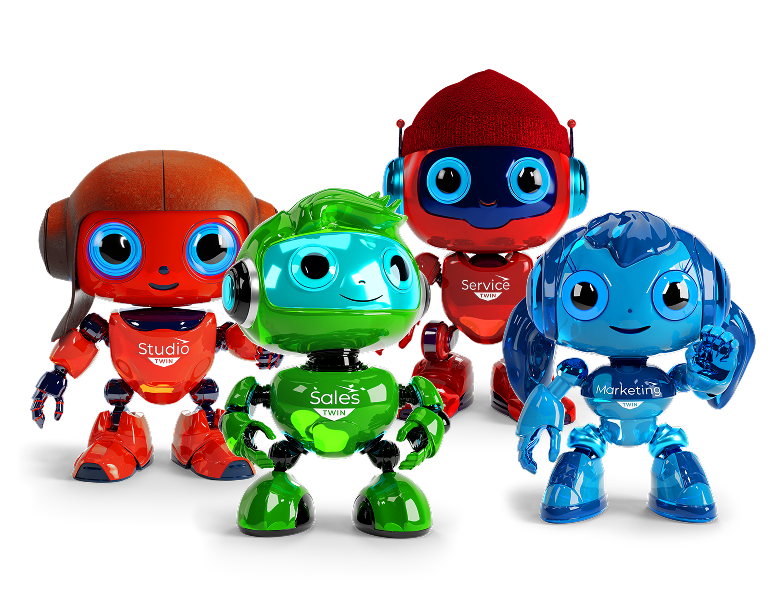-
No-Code
Platform
-
Studio
No-code agentic platform delivering the fastest time-to-value and the highest ROI
-
Studio
-
AI-Native CRM
CRM
-
AI-Native CRM
New era CRM to manage customer & operational workflows
CRM Products -
AI-Native CRM
- Industries
- Customers
- Partners
- About
The Complete Guide to Agentic Platforms & Best Agentic AI Software in 2026
Updated on
January 08, 2026
19 min read
Augment Teams with Creatio Agentic Platform

With Gartner predicting that over 40% of enterprise applications will feature role-specific AI agents by 2026, agentic platforms are rapidly emerging as the new era of enterprise software. They empower businesses to scale operations faster, reduce costs, improve decision-making, and accelerate digital transformation.
In this guide, we’ll cover everything business leaders need to know about agentic platforms — what they are, the key features that set them apart, and the leading solutions to consider for adoption in 2026 and beyond.
Key Takeaways:
- Unlike traditional automation, agentic platforms enable AI agents to plan, act, and adapt in real time across variety of different workflows.
- Agentic platforms are industry-agnostic by design, providing business users and IT teams with flexibility to create AI agents that align with the unique processes and goals of any organization.
- No-code and low-code agentic solutions are gaining traction as they empower both business users and IT teams to build tailored AI agents.
- The leading agentic platforms like Creatio, UiPath, and Moveworks demonstrate how agentic AI drives efficiency, scalability, and growth across industries.
What is an Agentic Platform?
An agentic platform is software that enables organizations to create and manage AI-powered agents that amplify human teams or autonomously execute tasks without constant oversight. These role-specific agents are tailored to business goals and, unlike traditional automation tools, can reason, collaborate, and continuously adapt to meet evolving needs.
Simply put, agentic platforms help companies to orchestrate complex workflows across departments through specialized AI-powered agents. For example, sales agents can qualify leads and draft proposals, a service agent could manage customer cases, and a finance agent may generate forecasts or automate reporting. Each agent operates independently, or with others, creating a network of AI-driven collaborators to streamline processes, reduce inefficiencies, and accelerate business growth.
Where are Agentic Platforms Used?
Agentic platforms are typically industry-agnostic but deliver the most value when tailored to the unique workflows and challenges of a specific organization. Its custom agents are designed to take on specialized responsibilities, working alongside human teams to automate routine processes, improve decision-making, and scale operations faster. Here are multiple use cases of how different industries are adopting agentic AI solutions:
- Banking – Compliance agents to monitor transactions for AML and fraud risks, lending agents that assess creditworthiness, and service agents that handle routine customer inquiries.
- Credit Unions – Member service agents, loan-processing agents to automate approvals, and compliance agents that keep up with regulatory changes.
- Insurance – Claim management agents to process cases, underwriting agents for risk assessment, and policy service agents that answer customer queries instantly.
- Mortgage – Document management agents that validate income and property records, and loan-origination agents that identify potential risks and ensure compliance with lending guidelines.
- Manufacturing – Production agents that balance demand and capacity, and supply chain agents that forecast and highlight bottlenecks.
- Pharma – Client account agents that manage patient data, regulatory agents that prepare submission documents, and supply chain agents that track sensitive inventory like vaccines.
- Transportation – Fleet-management agents to schedule repairs or reroute vehicles, and logistics agents that dynamically adjust routes for traffic, weather, or sudden demand spikes.
- Business Services – Client-onboarding agents that automate intake, workflow agents that coordinate cross-team projects, and knowledge-management agents that consistently update internal bases with the relevant customer cases and the right expertise.
- Telecom – Customer support agents that assist with handling service cases and billing agents that manage complex pricing models.
- Media & Advertising – Campaign analytics agents that track ROI across channels and suggest strategy optimizations, content agents that draft variations of ads and web form pages, and email generation agents that create personalized emails to maximize leads.
Across every industry, the real power of agentic platforms lies in their ability to create custom AI agents built for specific business goals. By tailoring agents to industry workflows, companies transform automation into intelligent collaboration between human and digital talent.
The State of AI Agents & No-Code
Learn how 560+ leaders across the world use AI and no-code to drive innovation today
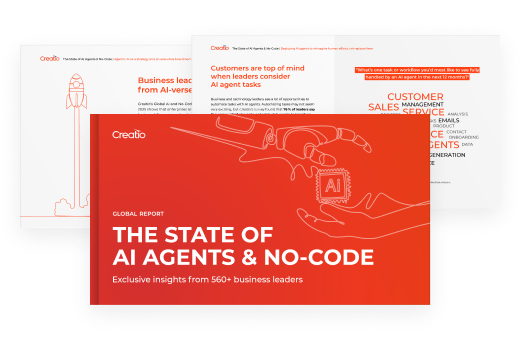
Key Features to Look for in Agentic AI Solutions
While many AI platforms provide useful business tools, agentic platforms can stand out with capabilities that go far beyond traditional automation. Based on our analysis of leading solutions, these are the core features that make agentic AI systems effective and valuable across industries:
Natural Interaction & Accessibility
Agentic platforms make AI agent technology accessible for everyone, not just developers. Business users can easily create and manage multi-agent ecosystems using natural language, no-code tools, and intuitive interfaces. This accessibility accelerates adoption and enables fully autonomous workflows that meet real business needs.
Enterprise-Grade Security & Governance
AI agents handle large volumes of sensitive business and customer data, so the enterprise-grade security of such systems is non-negotiable. The leading agentic platforms must include encryption, role-based access, auditability, and compliance with regulations like GDPR and CCPA ensure safe, transparent operations at scale.
Autonomous Planning & Adaptive Execution
Unlike traditional automation systems, agentic platforms allow AI agents to perceive, plan, and act autonomously, adapting to changing inputs in real time without human intervention. This autonomy helps organizations accelerate workflows, scale more efficiently, and ensure consistent results.
Role-Specific Agent Design
The real strength of agentic platforms is the ability to create agents with defined roles and responsibilities — for example, sales agents that qualify leads or finance agents that track compliance. By aligning agents with business goals and unique processes, organizations achieve deeper, more precise automation that delivers measurable impact.
Continuous Learning & Improvement
Agentic agents aren’t static; they continuously evolve. By analyzing outcomes, feedback, and new data, AI agent systems refine reasoning and workflows over time. Empowered by continuous learning, the agents become smarter, faster, and more efficient in the long-term run.
Seamless Ecosystem Orchestration
To deliver real value, agentic platforms must connect across the business stack - CRM, ERP, communication tools, and more. That is why, your software must ensure seamless orchestration between AI agents and core systems, eliminating silos and maximizing efficiency.
Scalable Multi-Agent Environment
Enterprise-ready platforms are designed to scale, supporting hundreds of workflows and processes without sacrificing performance or control. The best agentic platforms can run dozens or even hundreds of agents in parallel, coordinating tasks seamlessly and ensuring the platform grows in step with your business.
What are the Different Types of Agentic Platforms?
Based on the level of technical expertise and business needs, the AI agent platforms can generally be grouped into the following categories:
- No-Code Agentic Platforms – Built for accessibility, they enable business users and IT teams to create AI agents via intuitive drag-and-drop interfaces and natural language prompts. These are best for rapid deployment, ease of use, and integration-heavy workflows.
- Low-Code Agent Platforms – Provide a balance between flexibility and simplicity with visual interfaces but require more technical expertise compared to no-code builders. Such platforms are ideal for teams that are looking for a deeper customization and scaling more complex internal use cases.
- Traditional Development Frameworks – Designed specifically for developers and engineers who need full control over AI agent design and orchestration. These AI agent systems provide maximum customization and flexibility but require significant technical expertise and resources.
Today, more companies prioritize no-code and low-code agentic platforms to let business users and domain experts design tailored AI agents without extensive coding and achieve ROI faster compared to the traditional development frameworks.
Best Agentic AI Platforms in 2026: Overview
Agentic Platform | Best Use Case | G2 Rating |
| Creatio | Creating and deploying applications and AI agents using natural language and visual no-code designers | 4.8/5 |
| UiPath | Enterprises with existing RPA investments needing to extend automation with AI agent capabilities | 4.6/5 |
| Beam AI | Optimizing workflows through agentic process automation | 4.8/5 |
| CrewAI | Businesses with unique processes and extensive IT resources to build tailored AI agents | 4.2/5 |
| Microsoft 365 Copilot | Organizations that extensively use Microsoft 365 products and aim to improve in-app productivity with AI automation | 4.4/5 |
| Zendesk AI | Companies focused on improving customer service operations with AI-powered support | 4.3/5 |
| Aisera | Automating service desk operations using pre-built AI agent templates | 4.4/5 |
| Kore.ai | Building AI agents with flexibility to choose between different models, channels, and clouds | 4.7/5 |
| Moveworks | Deploying AI agents across various departments and systems with no integration hurdles | 4.6/5 |
| Langchain | Tech-savvy enterprises with extensive IT resources to build and deploy custom AI agent systems | 4.7/5 |
Top Agentic Platforms for 2026 & Beyond
As businesses embrace artificial intelligence, selecting the right tools becomes crucial for enhancing productivity and efficiency. This section explores 10 of the best agentic AI tools transforming operations across various industries.
Let's dive into the solutions that can revolutionize your business operational efficiency:
1. Creatio
Best for: Empowering teams across all departments with intelligent AI agents designed to adjust to specific roles and augment human potential.
Creatio is a leading agentic platform that automates CRM and workflows with no-code and AI embedded into its core. Its agentic AI capabilities, enhanced by generative and predictive AI, enable both business users and IT teams to automate routine tasks, scale operations, and accelerate growth.
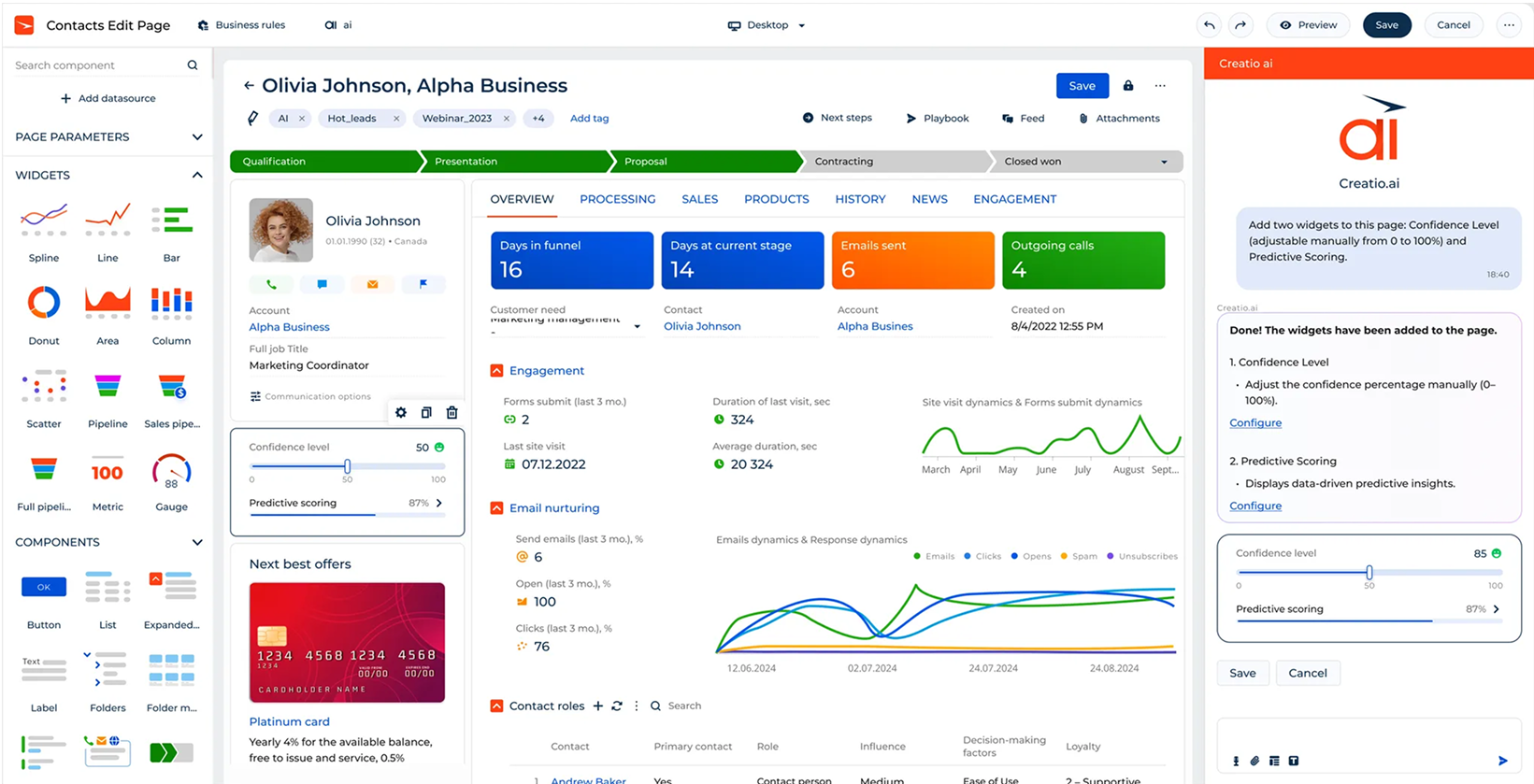
What makes Creatio stand out is that its AI agents are natively embedded across every layer of the platform. They have full awareness of all data objects, relationships, workflows, and processes, allowing them to autonomously understand, act, and learn within a business environment. Such a deep AI agent integration enables businesses to improve workflow fluidity, eliminate inefficiencies, and maximize productivity.
Creatio delivers AI agents as a core feature with no hidden fees or add-on licenses, making it easier for organizations to unlock the full potential of human-digital collaboration. With seamless integrations into tools like Microsoft Teams and Outlook, Creatio’s agentic platform enables businesses to significantly accelerate time-to-value, maximizing the potential of digital and human talent working together.
Key features:
- Sales Agents support sales teams by automating preparation, personalizing outreach, generating proposals, and surfacing key account insights. For example, a Meeting Prep Agent can recommend agendas, talking points, and relevant materials before each meeting, while a Quote Agent helps tailor sales quotes with AI-recommended products and pricing.
- Marketing Agents empower marketing experts to optimize campaign performance and fill in sales pipeline with qualified leads. For example, an Email Generation Agent can automatically generate personalized email content tailored to a specific audience and campaign goals, while a Marketing Content Agent creates blogs, social posts, and ad copy.
- Customer Service Agents help teams resolve cases faster with contextual responses and suggested knowledge articles. For example, a Customer Support Agent summarizes open cases with relevant history and context to speed up case resolution times, while a Knowledge Base Agent identifies high-value resolved cases and drafts knowledge articles.
- Vertical Agents are purpose-built for specific industries, such as finance, healthcare and manufacturing. These AI agents leverage powerful agentic AI capabilities, AI-native automation, and ready-to-use workflows to help organizations enhance operational efficiency. For example, a Credit Scoring Agent can assess potential risk and helps financial specialists make credit decisions with improved precision.
- No-Code Dashboard Agent can build and modify reports based on the natural language inputs, helping users set up AI-assisted analytics without technical effort.
- No-code Agent Builder allows business users to create, configure, and deploy custom agents by visually composing skills, workflows, and knowledge with no-code tools with built-in AI.
- Human-in-the-loop approach ensures that AI decisions are guided by humans, enhancing transparency, security, and accountability.
- Enterprise-grade security delivers data privacy and security features designed to meet the highest privacy and compliance standards.
Creatio's AI agents can be personalized to individual roles and workstyle and fine-tuned for specific workflows and access levels. By adapting to role requirements, they execute multi-step tasks and support decision-making that significantly enhances employee productivity and efficiency.
Rating:
G2: 4.8/5
Software Advice: 4.7/5
2. UiPath
Best for: Enterprises looking for an RPA platform to build AI agents and design business processes.
UiPath is a robotic process automation (RPA) platform that helps businesses automate repetitive tasks like data entry, lead processing, customer follow-up, and document processing. With its agentic AI capabilities, UiPath takes automation beyond simple rule-based processes, including intelligent decision-making and predictive analytics. UiPath enables businesses to build workflows that combine agentic adaptability, robotic precision, and human expertise. It provides goal-driven AI agents that can autonomously execute and optimize complex business processes, freeing employees to focus on more strategic tasks.
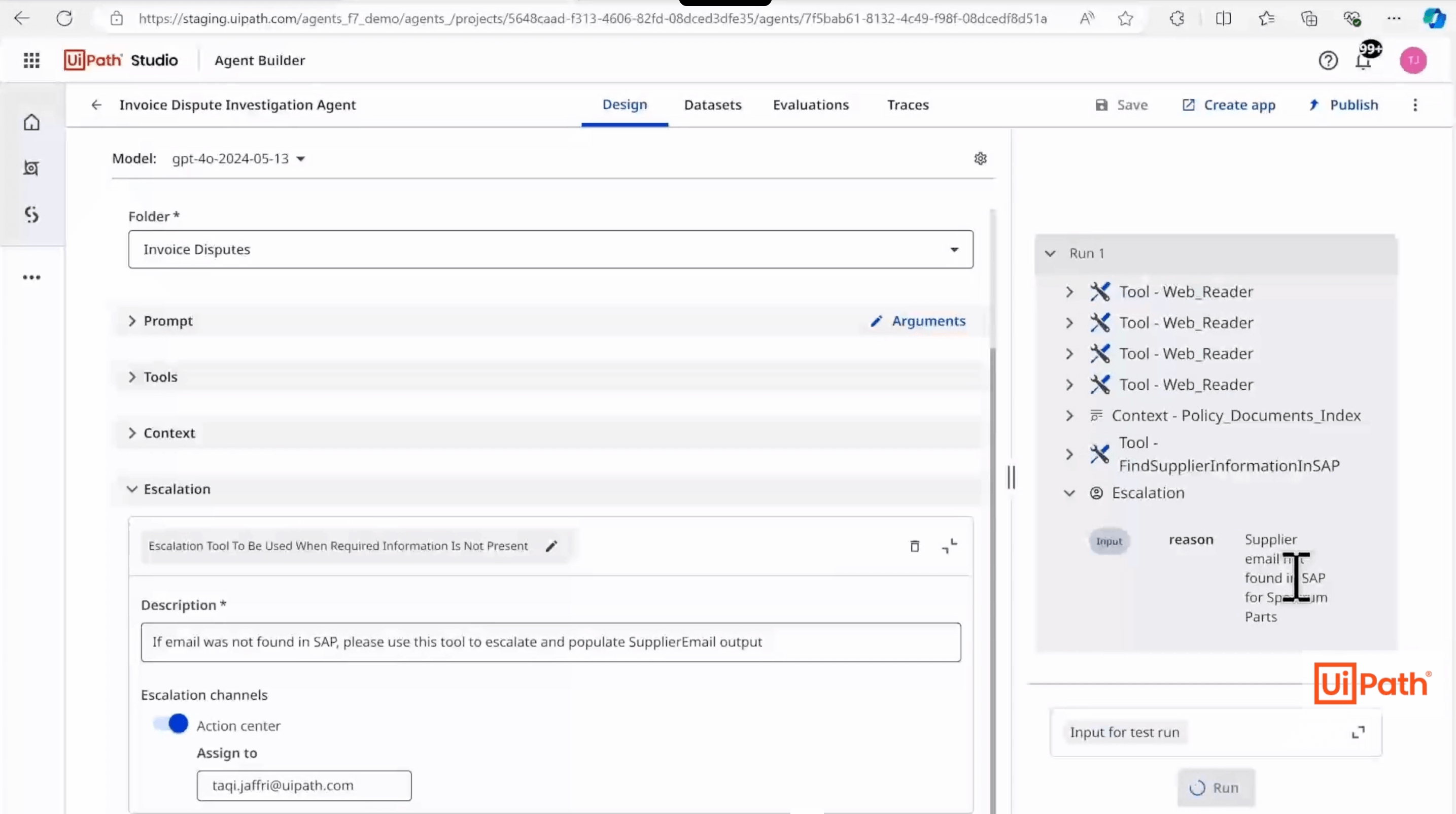
Key features:
- UiPath Agent Builder - allows enterprises to create, customize, and deploy AI agents to automate complex processes.
- UiPath Maestro - unifies agentic AI, automation, BPM, and process intelligence to design, run, and optimize end-to-end business processes.
- UiPath Healing Agent - automatically resolves issues with the UI to ensure automation works smoothly and provides suggestions to reduce time spent troubleshooting or debugging.
- UiPath Autopilot - leverages AI to boost employee productivity and efficiency.
- Low-code and pro-code environments - enable tech-savvy users to build agentic automations, agents, and robots.
- Security measures - policy management, role-based access, and platform-wide auditing to safeguard sensitive data.
Rating:
G2: 4.6/5
Software Advice: 4.6/5
3. Beam AI
Best for: Businesses looking to optimize their workflows with the help of intelligent AI agents.
Beam AI is an agentic AI platform built to automate workflows using a team of AI agents. Its systems allow businesses to build and integrate multiple learning agents to autonomously identify and automate tasks, streamlining key operations and increasing efficiency. These learning AI agents can optimize processes, reduce bottlenecks, and enhance output. Beam also offers industry-specific agents that address specific challenges and improve performance across various fields.
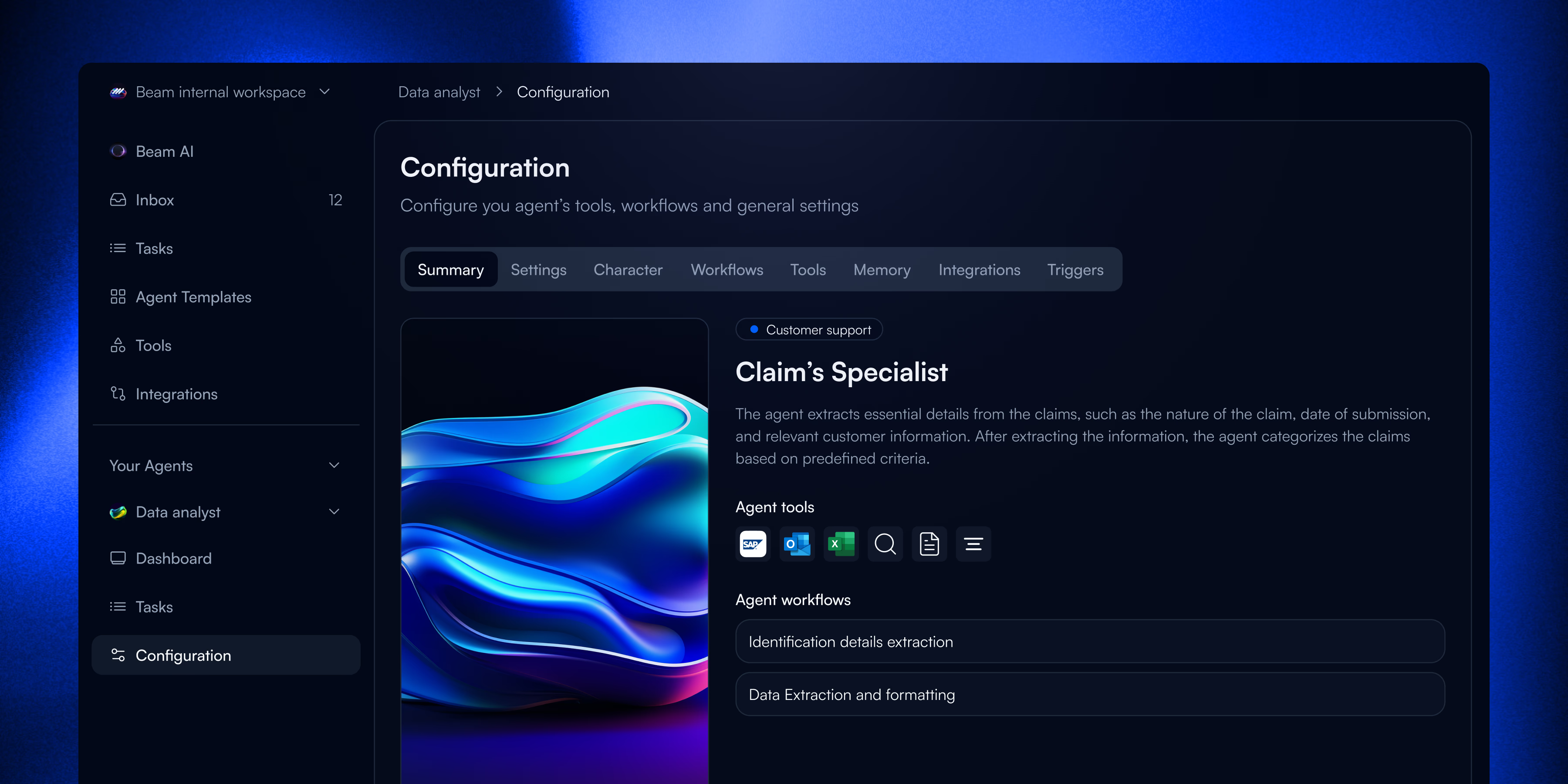
Key features:
- AI Agent Hub - central command center allows users to supervise a diverse team of AI agents, review current assignments, and plan future tasks.
- Agentic Automation - enables users to integrate AI agents into existing workflows to automate and optimize tasks.
- Integration with existing tools - Beam AI seamlessly integrates with tools, such as Airtable, Aircall, ServiceNow, Copper, Asana, Sage, and ClickUp.
- Pre-built agentic AI tools - a toolkit of pre-made, customizable AI tools to build and execute workflows.
- Agent Templates - pre-trained agents built to support various business functions, such as marketing, sales, customer service, HR, and finance across different industries, including insurance, healthcare, and retail.
- Data protection - Beam AI offers security measures to protect sensitive information and comply with GDPR standards.
Rating:
G2: 4.8/5
Software Advice: 4.8/5
4. CrewAI
Best for: Businesses with unique processes and extensive IT resources to build tailored AI agents.
CrewAI is a multi-agent platform that streamlines workflows across various industries, enabling users to build and deploy automated workflows using LLM and a cloud platform. It also provides pre-built AI agents, such as lead scoring for sales teams, content creation for marketers, stock analysis for finance teams, and coding agents for developers. CrewAI enables businesses to automate complex tasks and streamline workflows with AI-powered development, increasing team productivity.
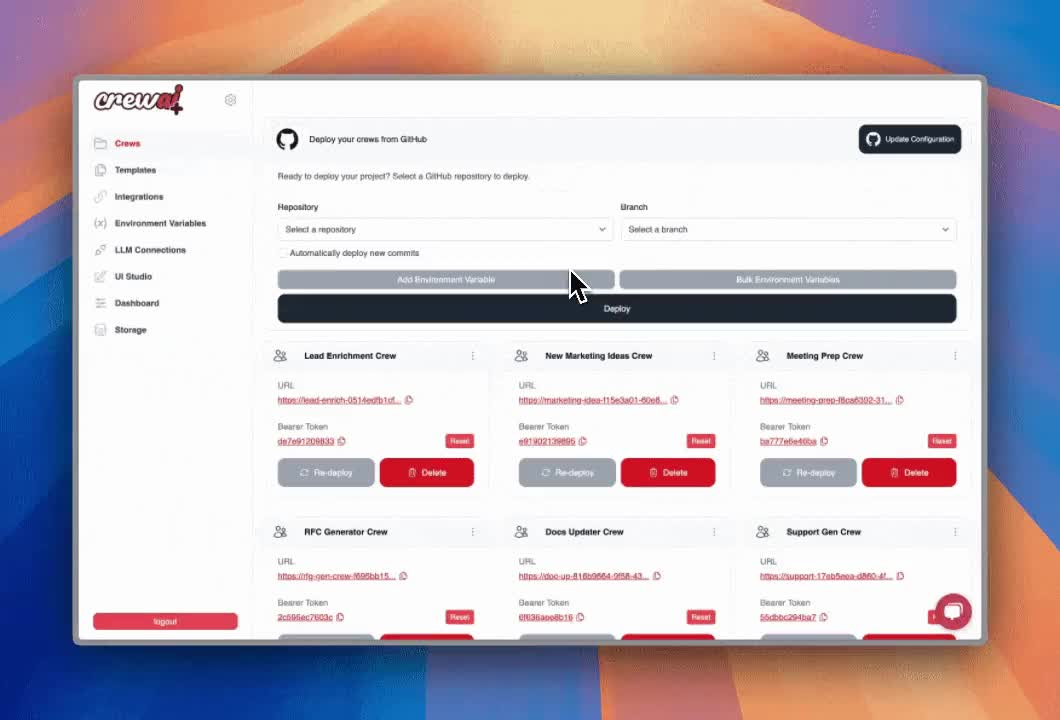
Key features:
- Multi-agent automation - Crew AI provides a UI Studio that allows businesses to build multi-agent automation using no-code tools and templates or coding.
- CrewAI Templates - a library of ready-made AI agent solutions that are fully customizable and easy to deploy.
- Open Source platform - allows developers to create AI agents with ease and scale.
- Integration with third-party tools - provides over 1000 integrations with popular tools and software to streamline workflows.
- Compliance with industry regulations - ensures the multi-agent platform complies with HIPAA and SOC2 compliance standards.
Rating:
G2: 4.2/5
Software Advice: 4.6/5
5. Microsoft 365 Copilot
Best for: Organizations using Microsoft 365 technology stack to run their business that want to improve their in-app productivity.
Microsoft Copilot is an agentic AI software that enhances productivity within the Microsoft 365 ecosystem by automating repetitive tasks such as document creation, data analysis, and email management. This tool leverages agentic AI to answer questions, offer support, brainstorm creative ideas, and suggest actions, enabling users to work faster and more efficiently. By integrating directly with Microsoft products like Word, Excel, and Outlook, Copilot AI allows teams to focus on high-value tasks without being bogged down by routine work.
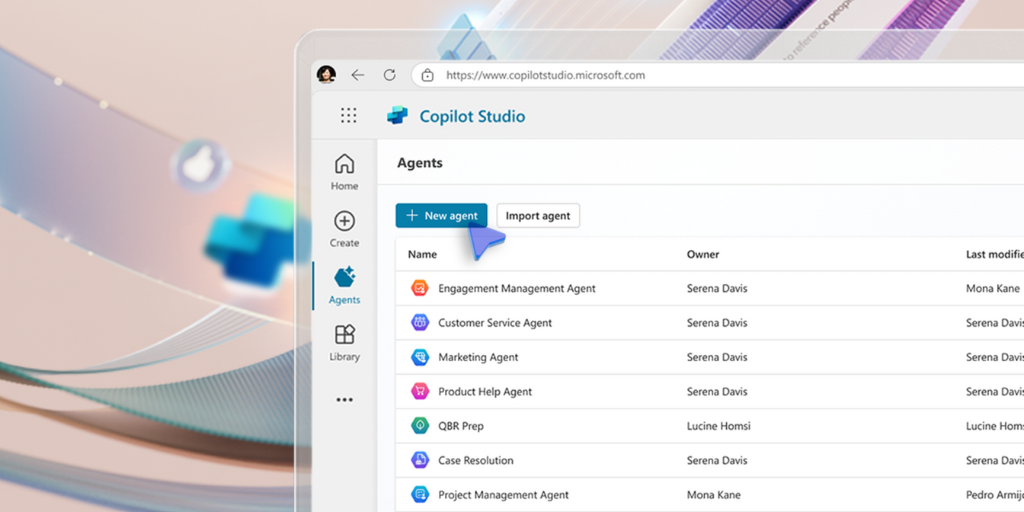
Key features:
- Copilot Chat - allows users to create AI-driven agents that connect to an organization's data sources and automate business processes. Users can create an agent by describing its purpose in the chat and providing knowledge bases.
- Copilot in Word - integrates work data directly into Word documents to create drafts, iterate, and edit, significantly reducing the time it takes to create articles, documents, etc.
- Copilot in Outlook - helps users manage their inbox by analyzing email content and prioritizing the most critical messages. It also summarizes the messages and provides suggestions on the following action.
- Copilot in Excel - enables users to work in Excel spreadsheets by describing the task to the Copilot rather than using formulas.
- Copilot in PowerPoint - enables fast generation of on-brand presentations based on description in natural language.
Rating:
G2: 4.4/5
Software Advice: 4.6/5
6. Zendesk AI
Best for: Businesses focused on optimizing customer service operations.
Zendesk is a customer service platform powered by AI capabilities designed to automate ticket management, improve agent efficiency, and provide 24/7 support through intelligent chatbots and self-service tools. With its agentic AI capabilities, Zendesk AI enhances customer interactions by routing tickets based on urgency and sentiment, automating responses to common queries, and offering personalized service. This leads to faster resolution times, increased customer satisfaction, and reduced workload for support teams. Thanks to intelligent guardrails and full visibility, customer service representatives can monitor AI agents' resolutions and ensure quality of each interaction.
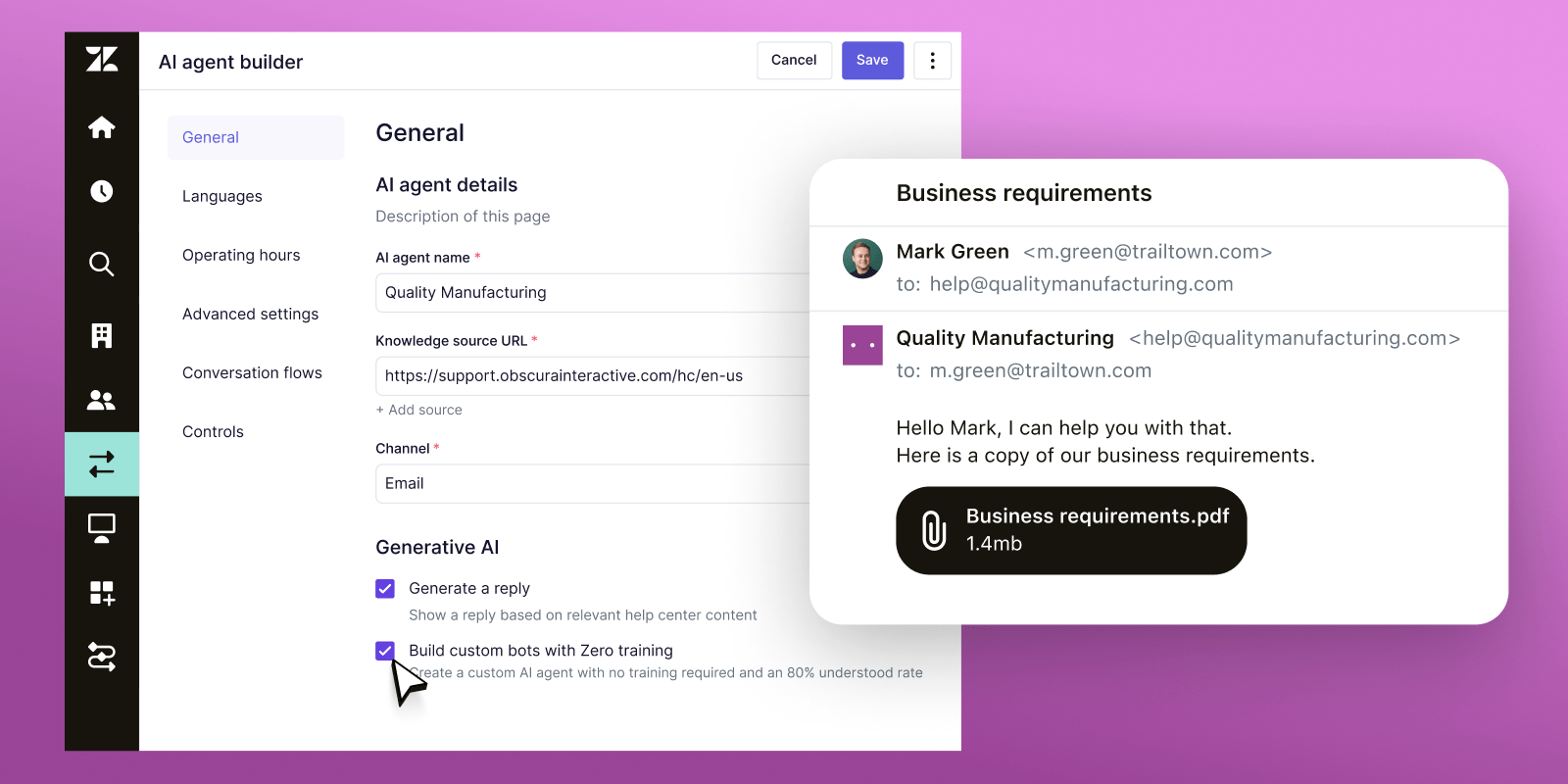
Key features:
- Instant responses - quickly generate on-brand responses to common questions using internal knowledge bases.
- Custom conversation flows - enable businesses to design smarter paths to resolution that solve complex issues automatically.
- Integration with backend systems - AI agents connected to the backend system can solve interactions from start to finish by authenticating customers and providing contextual responses.
- Agent Copilot - assists human agents with real-time suggestions for responses, next best actions, and knowledge base articles.
- AI insights - provide actionable insight on how to boost AI agents' performance, identify issues, and make improvements.
Rating:
G2: 4.3/5
Software Advice: 4.4/5
7. Aisera
Best for: Supporting service desk operations and building AI agents with pre-made templates.
Aisera is a unified AI agent platform built for enterprises to support service desk operations across multiple teams, including HR, IT, legal, finance, and customer service. Aisera's AI agents autonomously execute actions and automate tasks to increase employee productivity. By leveraging conversational AI and generative AI technologies, Aisera enables faster decision-making, reduces manual workloads, and enhances operational efficiency. The platform integrates with third-party enterprise applications, ensuring all business units benefit from consistent and intelligent service automation.
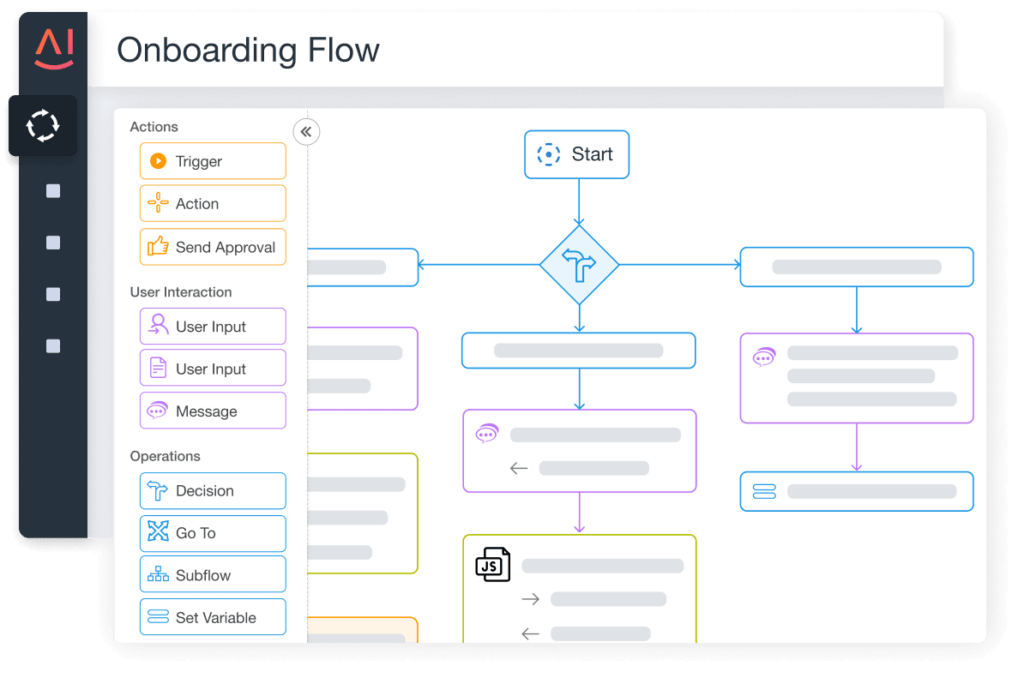
Key features:
- Agent Studio - enables users to create AI agents using low-code, no-code, and pro-code tools as well as pre-built agent templates to help them start faster.
- Hyperflow studio - allows users to create and manage advanced workflows with multi-step automation and complex dependencies.
- AI workflow builder - provides a library of 1000+ pre-built actions to enable workflow creation with low-code/no-code interface.
- AI Agent System - provides purpose-built agents that coordinate decision-making, orchestrate business processes, and execute tasks.
- Multimodality - Aisera's AI agents understand different input types, including text, voice, images, and documents, to provide a more natural experience.
- AI-powered summarization - automatically summarizes reports, documents, customer service cases, and more to increase employee productivity.
- Enterprise-class security and governance - provides data protection tools to ensure compliance with industry regulations, such as GDPR, HIPAA, etc.
Rating:
G2: 4.4/5
Software Advice: 4.5/5
8. Kore.ai
Best for: Building AI agents with flexibility to choose between different models, channels, and clouds.
Kore.ai is an agentic AI platform that allows organizations to design, deploy, and manage.
AI agents at enterprise scale across various models and clouds. It provides built-in governance and observability, accelerating user adoption, and enabling businesses to maintain full control over their agentic AI tools. Kore.ai AI agents enhance employee experiences, automate business processes, and improve customer service.
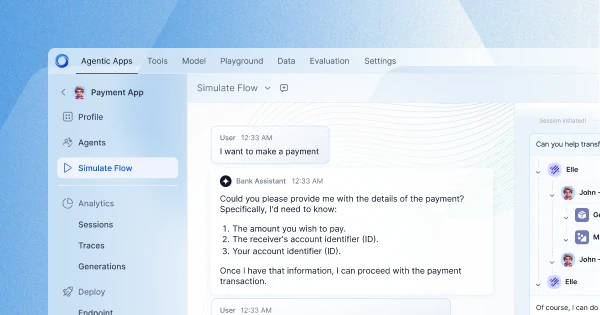
Key features:
- Pre-built industry solutions - Kore.ai provides over 250 customizable agent and tool templates for various industries, such as banking, retail, healthcare, recruiting, HR, and IT.
- Enterprise RAG search - derives insights from structured and unstructured data to help make data-driven decisions.
- Pre-built AI agents - a library of ready-to-use AI agents that seamlessly integrate into enterprise operations to automate key IT and HR tasks.
- No-code workflow builder - provides ready-to-use prompts, process templates, and no-code forms to visually build and deploy AI agent-powered workflows.
- Seamless integration - Kore.ai agent platform seamlessly integrates with enterprise applications, various AI models, data sources, communication channels, and cloud providers.
- Security and compliance - provides enterprise-grade governance and role-based access control to protect confidential data and meet regulatory standards.
Rating:
G2: 4.7/5
Software Advice: 4.4/5
9. Moveworks
Best for: Deploying AI agents across various departments and systems with no integration hurdles.
Moveworks offers an agentic AI assistant designed to find answers and automate tasks across enterprise systems and applications. It combines generative AI and search capabilities to take autonomous actions and automate business processes across the technology stack. Movework agentic AI capabilities increase team productivity across IT, HR, sales, marketing, service, and engineering departments, allowing employees to focus on more strategic initiatives and projects while they handle routine work.
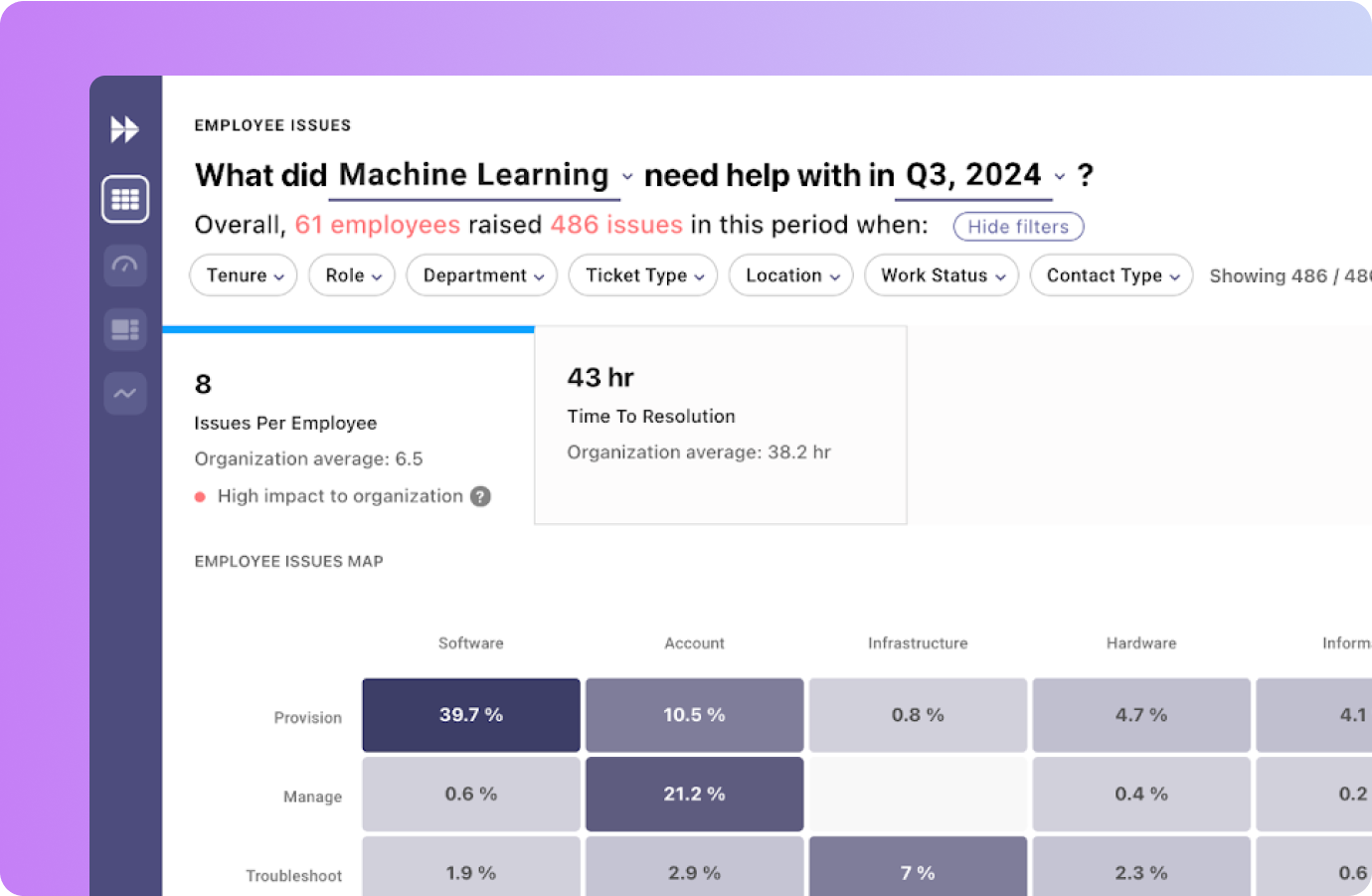
Key features:
- Agentic AI Assistant - offers employees personalized, omnichannel support available 24/7 in multiple languages.
- Agentic Reasoning Engine - understands user intent, reasons, plans, and executes multi-step processes to achieve specific goals.
- Autonomous execution - executes tasks in connected systems.
- AI Agent Builder - enables businesses to build enterprise-ready AI agents across various departments and connect them with existing tools, such as CRMs, ERPs, HRIS, and more.
- AI Agent Marketplace - a library of pre-built AI agent solution packs that are easy to install across various systems.
- Agent Studio - provides a guided low-code editor experience that allows developers to quickly create and customize AI agents that follow unique business policies and meet specific enterprise needs.
Rating:
G2: 4.6/5
10. Langchain
Best for: Tech-savvy enterprises with extensive IT resources looking for a platform to build and deploy AI agents from scratch.
Langchain provides a platform for building agentic AI solutions, supporting users at every step of the agent development lifecycle. It enables businesses to build AI agents with pre-made templates and a visual agent IDE to accelerate development by reusing, configuring, and combining agents. Langchain AI agents are designed to handle complex tasks with human oversight to ensure reliable execution. Users can monitor their performance in real time, quickly find and resolve issues, and improve their capabilities. Langchain agents can work independently to automate routine tasks or orchestrate more complex workflows in multi-agent systems.
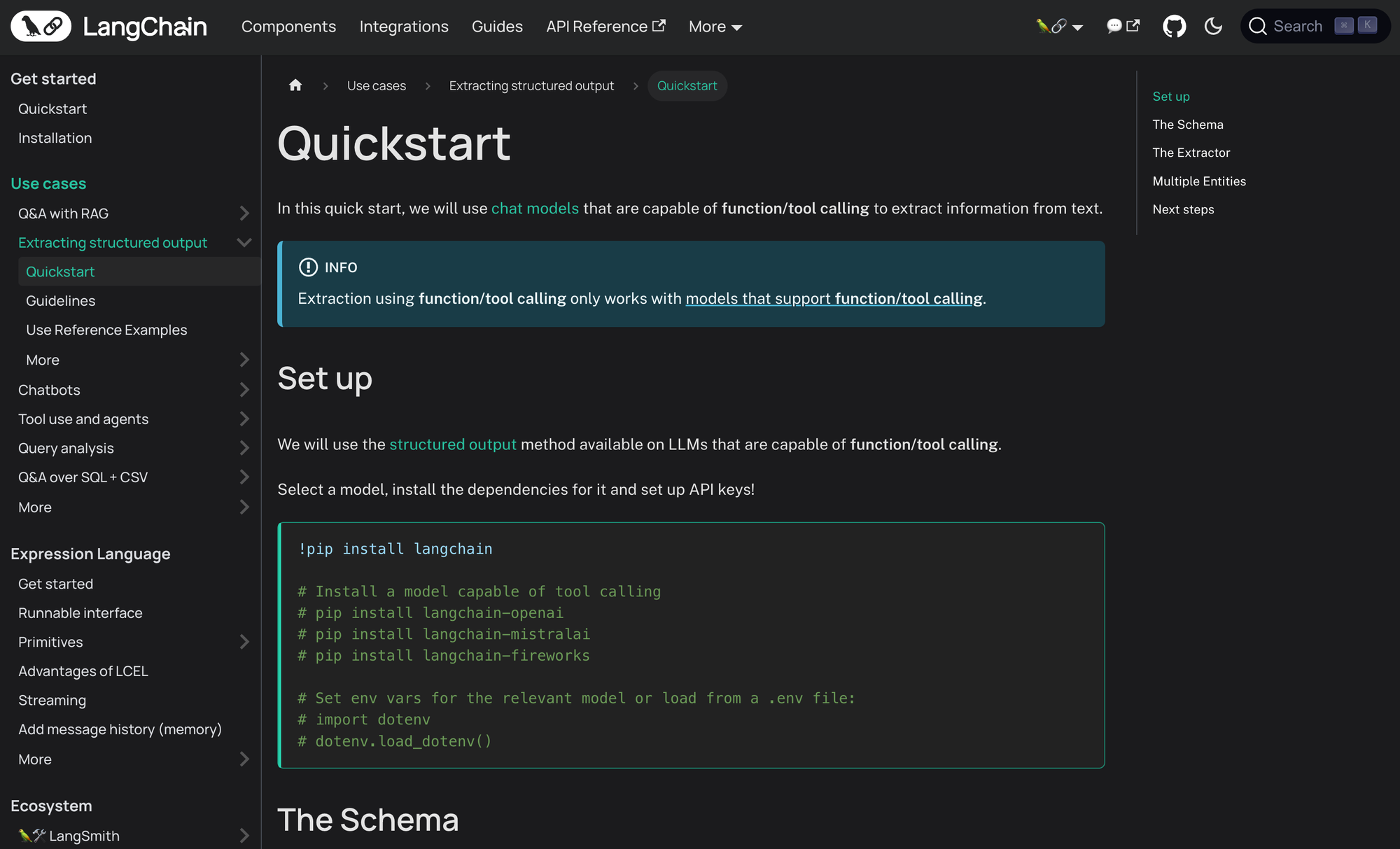
Key features:
- LangGraph - enables developers to build fully customizable agent workflows with single, multi-agent, or hierarchical workflows.
- LangChain - provides an open, composable framework for building LLM apps with different models, tools, and databases.
- Library of integrations - offers over 600 integrations, including different model providers, tools, and vector stores to facilitate connection to live data sources.
- LangSmith - platform for testing, debugging, and monitoring AI app performance. It allows users to follow apps step-by-step to find and fix issues easily.
- LangGraph platform - allows users to develop, deploy, and scale agents within one platform. It also enables centralized agent management, where developers can discover, share, and reuse agents made by other teams.
Rating:
G2: 4.7/5
How to Choose the Right Agentic Platform for Your Business
The best agentic AI system is the one that delivers measurable results for your business. Below are five most important steps to ensure the platform aligns with your business objectives and needs:
Evaluate your business goals
Before you start looking into available options, ask yourself:
- Why your business actually needs an agentic AI platform?
- What tasks do you want to automate with AI agents?
- What goals do you wish to achieve with the agentic AI solution?
These answers will help you understand what platform and features will best meet your business needs, and the areas they should be implemented in.
Prioritize your must-have features
Agentic systems range from platforms that create simple reflex agents for repetitive tasks to multi-agent platforms that orchestrate entire business processes. Some platforms are general-purpose across industries, while others are role-based and tailored to meet the specific needs of a particular niche. To choose the right agentic AI solution for your business teams, explore its core capabilities, as well as the limitations, so you can set realistic expectations and avoid overbuying.
Learn more about AI agents from our expert guide and choose the solution tailored to your business goals.
Check Integration & Ease of Adoption
Agentic platforms should integrate seamlessly with your core business systems, such as CRM, ERP, communication tools, and broader tech stack. Look for built-in integrations and APIs — for example, Creatio natively embeds AI into productivity tools to avoid over complicated integrations.
At the same time, user adoption is just as critical as integration. For example, nearly 40% of financial services leaders in the Creatio AI Survey cited low adoption as their top AI challenge. So, it’s important to choose a platform with an intuitive, natural-language interface so teams can configure, monitor, and scale automation easily. The user-friendly experience in agentic platforms can not only accelerate adoption, but also significantly speed time-to-value.
Evaluate Security & Compliance
Because agentic platforms manage sensitive company and customer data across multiple systems, security and compliance must be non-negotiable. Look for providers that meet standards like GDPR and CCPA, and ask how they handle data retention, audit logging, and access control across AI agents.
Prioritize solutions with enterprise-grade safeguards such as multi-layer encryption, role-based access, and multi-factor authentication. These measures not only protect against breaches but also help you avoid regulatory penalties and reputational risk while ensuring trust in AI-driven processes.
Balance Cost Against Long-Term Value
Agentic AI platforms can differ widely in price, but lower upfront costs don’t always mean better value. Focus on ROI — how much time, efficiency, and scalability the platform can deliver over the long term. Factor in subscription, maintenance, and training costs to get a true picture of total ownership.
Beware of the tools with add-ons built on legacy systems; they often lead to rising fees for advanced features or integrations. The right choice is a platform that delivers sustainable outcomes without hidden costs.
Summary
Agentic platforms have quickly shifted from “nice-to-have” to a must-have technology for modern businesses. Beyond basic automation, these systems empower users to create custom AI agents that plan, execute, and adapt workflows across departments. Its agentic AI capabilities help businesses optimize processes, improve decision-making, and deliver outstanding customer experience.
Choosing the right AI agent platform is not just a tech decision. It’s a business-critical move to stay efficient, scalable, and ready for today’s market challenges.





















































